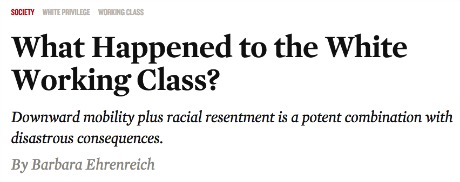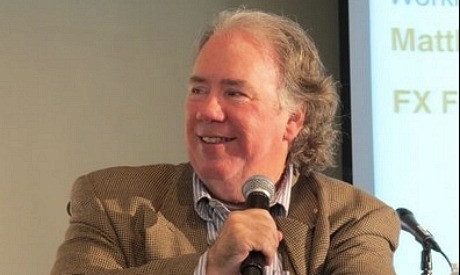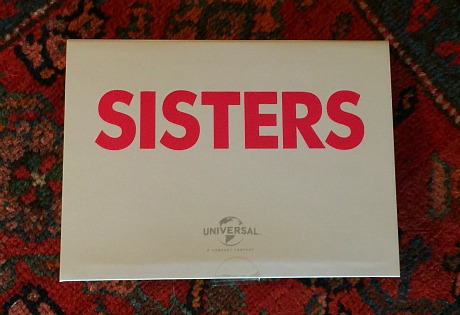“A creeping fear of being caught in a mass rampage has unmistakably settled itself firmly in the American consciousness. People are able to recite with precision how often they think about a mass shooting touching them. Every day. Twice a week. Up to four times a day. Every other day. Every two weeks. Every time they’re in a crowded space. Whenever her teenagers are out. Every time she walks into her office and back to the parking garage. Every day. Every day. Every day. ‘And they are worrying that the randomness of it, which on one hand makes the odds of something happening to them very small, that randomness also makes it possible to happen to them,’ says Alan Hilfer, the former chief psychologist at Maimonides Medical Center in Brooklyn.” — from a 12.3 N.Y. Times survey piece by N.R. Kleinfeld, called “Fear in the Air, Americans Look Over Their Shoulders.”
 Jeffrey Wells
Jeffrey Wells
No Country For Old Beefy White Guys
Key passages from Barbara Ehrenreich’s 12.1 Nation piece about the declining quality of life among rural white working-class guys, who are feeling fucked and diminished from all sides and are therefore clinging to guns as they slide more and more downhill as they die at a higher rate than in decades past…hence Donald Trump:

Excerpt #1: “In relation to people of color, whites have long had the advantage of higher earnings, better access to health care, safer neighborhoods, and of course freedom from the daily insults and harms inflicted on the darker-skinned. There has also been a major racial gap in longevity — 5.3 years between white and black men and 3.8 years between white and black women — though, hardly noticed, it has been narrowing for the last two decades. Only whites, however, are now dying off in unexpectedly large numbers in middle age, their excess deaths accounted for by suicide, alcoholism, and drug (usually opiate) addiction.”
Excerpt #2: “When the federal government finally weighed in on the side of desegregation, working-class whites were left to defend their own diminishing privilege by moving rightward toward the likes of Alabama Governor (and later presidential candidate) George Wallace and his many white pseudo-populist successors down to Donald Trump.”
Excerpt #3: “At the same time, the day-to-day task of upholding white power devolved from the federal government to the state and then local level, specifically to local police forces, which, as we know, have taken [white power] up with such enthusiasm as to become both a national and international scandal. The Guardian, for instance, now keeps a running tally of the number of Americans (mostly black) killed by cops (as of this moment, 1,209 for 2015), while black protest, in the form of the Black Lives Matter movement and a wave of on-campus demonstrations, has largely recaptured the moral high ground formerly occupied by the civil rights movement.”
Fond Farewell to Frank Lopez, Elfego Baca, Eduardo Prizzi, Mr. MacMillan
Last month I was wandering around during a Savannah Film Festival after-party, and I noticed a white-haired guy sitting all alone at a table in a corner. I wasn’t entirely convinced it was Robert Loggia, but he sure was a dead ringer. And what did I do? Did I walk over and say “excuse me but I’m 95% convinced you’re Bob Loggia…am I right?” No, I said nothing, guarded coward that I sometimes am. Even if it wasn’t Loggia (he had Alzheimer’s and probably didn’t do a lot of travelling outside his Brentwood home), I’m sorry for not saying hello anyway. Because now he’s gone. Loggia’s first big breakout happened in Walt Disney‘s Elfego Baca series (’58 to ’60), and then he half-hibernated for over 15 years until his next distinctive performance in Blake Edwards‘ S.O.B. Loggia worked steadily since but delivered classic performances in five world-class films, four of them in the ’80s: Frank Lopez in Scarface, Eduardo Prizzi in Prizzi’s Honor, Sam Ransom in Jagged Edge, Mr. MacMillan in Big and Mr. Eddy/Dick Laurent in Lost Highway.
Boston Online Joe Popcorn Guru-Defying Awards
Three days ago the New York Film Critics Circle creamed over Carol, and now the Boston Online Film Critics Association has tumbled for Mad Max: Fury Road to the tune of five awards — Best Picture, Best Director (George Miller), Best Cinematography (John Seale), Best Editing (Margaret Sixel) and Best Original Score (Junkie XL). And Creed took two awards — Michael B. Jordan for Best Actor and Sylvester Stallone for Best Supporting Actor. Will this be a regional critics group trend for the next two or three weeks — to honor films that haven’t been heavily favored by the Gurus of Gold or Gold Derbyites, to deny Spotlight any Best Picture awards, to ignore The Revenant, to favor genre films about physical conflict, to celebrate Kristen Stewart‘s performance in a negligible Olivier Assayas film that peaked during the 2014 film-festival season? Other BOFCA honors: Best Actress — Brooklyn‘s Saiorse Ronan, Best supporting Actress — Kristen Stewart, Clouds of Sils Maria, Best Documentary — Amy, Best Animated Film — Inside Out.
Feeney/Wells Kick Revenant Tires
The other day renowned critic, author and filmmaker F.X. Feeney and I spent a half-hour discussing Alejandro G. Inarritu‘s The Revenant — here’s the mp3.

F.X. Feeney, author of “Orson Welles: Power, Heart, and Soul”, “A. Hepburn”, “Michael Mann“, “Roman Polanski“.
Here’s a short Feeney piece about the film: “A man left for dead rises and, against every possible obstacle, seeks vengeance against those who not only abandoned him but murdered someone he loves. This is the plot of The Revenant. It has a classical familiarity. John Boorman’s 1968 crime drama Point Blank follows this outline, as does Man in the Wilderness, a 1971 western which starred Richard Harris and John Huston and was coincidentally based on the same historic incident – but all prior variations on such themes disappear as this film unfolds.
“One doesn’t ‘watch’ The Revenant so much as live it. If this movie becomes a smash hit, it will be because survival — pure and simple — has become such an across the board concern in so many of our imaginations, especially as the world degenerates daily into an ever more senseless shoot ‘em up. Director Alejandro G. Iñárritu gives actors Leonardo DiCaprio and Tom Hardy ample time and space to act out this primal duel.
Disco-Era Detectives?
Shane Black‘s The Nice Guys (Warner Bros., 5.20.16) is some kind of thriller comedy costarring Ryan Gosling, Russell Crowe, Kim Basinger and Margaret Qualley. Cowritten by Black and Anthony Bagarozzi. Boilerplate: “Set during the 1970s, a Los Angeles private detective partners up with a rookie police officer to inquire about the apparent suicide of a fading porn star.” Correct me if I’m wrong, but this feels like a programmer, a throwaway.
Sisters: A Best Picture Contender
Jason Moore‘s Sisters (Universal, 12.18) is a relationship comedy about the disparate Ellis sisters reviewing and reliving their childhood…or something like that. Tina Fey‘s Kate is loosey-goosey and somewhat immature, and Amy Poehler‘s Maura is divorced and uptight, etc. Pic is about “one last party at their childhood home, which their parents are about to sell,” etc. Today I received an award-season screener — the first time in my life I’ve received a mainstream comedy by UPS/Fed Ex before the release date. The all-media is on 12.15 — the embargo lifts the following day.

Hateful’s Comic Aspect
The word around the campfire is that the Weinstein Co. gradually began to realize that The Hateful Eight is being processed by screening invitees as a kind of black comedy. I’m told the Weinsteiners wanted the Golden Globers to re-classify it as a comedy/musical but the effort didn’t succeed. The Hateful Eight isn’t my idea of a comedy. There isn’t much difference in Hateful‘s tone and attitude and that of Reservoir Dogs, Inglorious Basterds and Death Proof, and I’ve never heard them described as comedic. Hateful delivers the same old par-for-the-course Tarantino verbal swagger, loquacious and arch and yaddah-yaddah. Yes, a certain meta-humorous attitude is part of that but you can’t hoist up your britches and announce a re-definition of the term “comedy” because it suits your purpose to do so. Well, you can but not if people don’t go along with it.

Hateful Eight stirrup or handcuff swag, or misidentified as same?
By the way: Given that The Hateful Eight and The Revenant are a pair of high-style, ultra-violent wintry westerns opening against each on 12.25, you’d think that either 20th Century Fox or the Weinstein Co. would shift the release date of one or the other. But it won’t happen. The general presumption seems to be that the Tarantino will perform better than the Inarritu. The Tarantino brand is widely known and accepted as a swaggering, colloquial people-friendly thing and that the Inarritu brand is about ravishing images and solemn heavy-osity, which never has been and never will be a Joe Popcorn-type deal.
Want My Sakomoto Fix Now
I’ve stated once or twice that I’ve fallen head over heels with Ryuichi Sakamoto‘s Revenant score. Yes, I’m aware that the score is co-composed by Sakamoto, Bryce Dessner and German electronic musician Alva Noto but it’s the Sakamoto sections (bassy symphonic strings for the most part) that lifted me out of my seat. Sakomoto’s music sounded that much better at the Arclight last night than at the Zanuck, by the way. My ribs were humming with pleasure from the vibration. A couple of days ago I tried to obtain a couple of mp3 excerpts from the Revenant score, and was promptly shut down. I can’t fathom why. It’s nuts to hide awareness of this score. People need be told it’s one of the standouts right now.
Second Verse, Same As The First
Reviews of Alejandro G. Inarritu‘s The Revenant will pop at 1 pm Pacific. I know I’m repeating myself but it took me two viewings to really get it — to fully submit and absorb that solemn and immersive symphonic effect without the mitigating difficulty of dealing with the bear-claw, ice-water brutality of Leonardo DiCaprio‘s ordeal. And sometimes this sort of thing happens. You have to be receptive to changes and expansions. Some films are a journey, and they aren’t one-stop-shopping. Have you ever encountered someone you found difficult or prickly at first but whom you came to really like once you got to know them? Some movies are like that. I only know that The Revenant became rapture last night during my second viewing. It may be that the vast majority of ticket-buyers will get The Revenant after a single viewing and that’ll be that, and that I’m a weirdo for needing two viewings. But I know there have been more than a few films in the past that I didn’t get the first time but totally got after the second or third viewing, Tony Gilroy‘s Michael Clayton being one. We all understand that movies of this sort (i.e., not conventionally “entertaining” at first but delivering something more profound and lasting in the long run) are the ones that people fondly remember months, years and decades later. This is one such occasion.
Revenant Stock Surge
Well, the second time is definitely the charm with The Revenant. You just have to get past the shock of the brutality contained in the survival ordeal that Leo goes through. Once you know what’s coming and you’ve digested that and thought it through, the second viewing (which happened tonight at the Hollywood Arclight) results in a serious uptick. I was entranced all through it. Not that I didn’t admire The Revenant the first time, but this time I fell heavily in love with every aspect, every shot, every beat, every performance and definitely the music again…Ryuichi Sakamoto! The Revenant is all about naturalism & what is necessary and inescapable (if ghastly) given what happens to Leo whereas the final third of a film I can’t discuss for a while is, for me, sadistic and sickening — cynical, tongue-in-cheek “style” violence as its very worst. In short, this film inadvertently shined a nice contrasting light on The Revenant. Get past the wounds and the agony and the brutality of nature in the Inarritu and it’s basically sad and aching and soulful and almost serene. I really love it now. My initial concerns about the brutality evaporated tonight, like snow in the spring.
The Exile On Main Street Of Movie Soundtrack Albums?
I’ve never received award-season swag of this kind — a double-vinyl foldout album of Johan Johansson’s Sicario soundtrack. 18 tracks. It doesn’t matter that I don’t have a turntable system. Impressive marketing equation: If they went to the trouble of making a two-record vinyl album it has to be impressive music…right? I don’t remember it all that clearly, but that’s considered a good thing for the most part.

